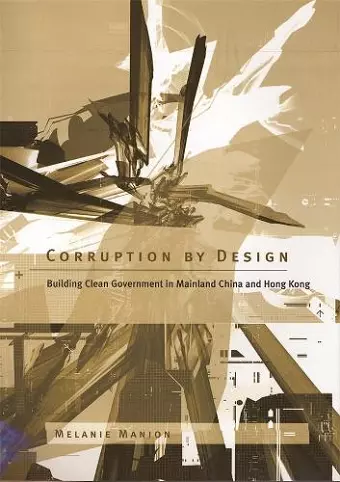Corruption by Design
Building Clean Government in Mainland China and Hong Kong
Format:Hardback
Publisher:Harvard University Press
Published:30th Dec '04
Currently unavailable, and unfortunately no date known when it will be back

Corruption by Design provides an excellent analysis of how officials in Hong Kong and mainland China have reacted to widespread corruption. Manion argues persuasively that strategies of reform must include enforcement, education, and institutional design. Her work brings together a huge amount of original material on mainland China and it is the most thorough examination of corruption in that country to date. This is significant given the secretive nature of corruption itself and the relative lack of transparency on the mainland. -- John P. Burns, University of Hong Kong It is conventional wisdom that there has been an explosion of corruption in mainland China in the reform era, with adverse consequences for the legitimacy of the regime. Yet there have been few book-length studies of the topic in the last five years. With its lucid argument and dual focus on Hong Kong and mainland China, Corruption by Design promises to be an important contribution. -- Dali Yang, University of Chicago
This book contrasts experiences of mainland China and Hong Kong to explore the pressing question of how governments can transform a culture of widespread corruption to one of clean government. Manion examines Hong Kong as the best example of the possibility of reform.
This book contrasts experiences of mainland China and Hong Kong to explore the pressing question of how governments can transform a culture of widespread corruption to one of clean government. Melanie Manion examines Hong Kong as the best example of the possibility of reform. Within a few years it achieved a spectacularly successful conversion to clean government. Mainland China illustrates the difficulty of reform. Despite more than two decades of anticorruption reform, corruption in China continues to spread essentially unabated.
The book argues that where corruption is already commonplace, the context in which officials and ordinary citizens make choices to transact corruptly (or not) is crucially different from that in which corrupt practices are uncommon. A central feature of this difference is the role of beliefs about the prevalence of corruption and the reliability of government as an enforcer of rules ostensibly constraining official venality. Anticorruption reform in a setting of widespread corruption is a problem not only of reducing corrupt payoffs, but also of changing broadly shared expectations of venality. The book explores differences in institutional design choices about anticorruption agencies, appropriate incentive structures, and underlying constitutional designs that contribute to the disparate outcomes in Hong Kong and mainland China.
Corruption by Design provides an excellent analysis of how officials in Hong Kong and mainland China have reacted to widespread corruption. Manion argues persuasively that strategies of reform must include enforcement, education, and institutional design. Her work brings together a huge amount of original material on mainland China and it is the most thorough examination of corruption in that country to date. This is significant given the secretive nature of corruption itself and the relative lack of transparency on the mainland. -- John P. Burns, University of Hong Kong
It is conventional wisdom that there has been an explosion of corruption in mainland China in the reform era, with adverse consequences for the legitimacy of the regime. Yet there have been few book-length studies of the topic in the last five years. With its lucid argument and dual focus on Hong Kong and mainland China, Corruption by Design promises to be an important contribution. -- Dali Yang, University of Chicago
- Nominated for Woodrow Wilson Foundation Award 2005
- Nominated for Gregory Luebbert Best Book Award 2005
- Nominated for William H. Riker Book Award 2005
ISBN: 9780674014862
Dimensions: unknown
Weight: unknown
296 pages